

Je hais les indifférents, par Antonio Gramsci. Je hais les indifférents.
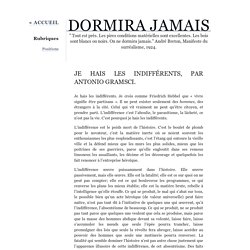
Je crois comme Friedrich Hebbel que « vivre signifie être partisans ». Il ne peut exister seulement des hommes, des étrangers à la cité. Celui qui vit vraiment ne peut qu’être citoyen, et prendre parti. A-t-on atteint un « pic des objets » Si l’on devait la caractériser en des termes mathématiques, la trajectoire de notre civilisation serait une courbe exponentielle.
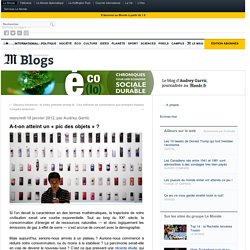
Tout au long du XXe siècle, la consommation d’énergie et de ressources naturelles — et donc logiquement les émissions de gaz à effet de serre — s’est accrue de concert avec la démographie. Mais aujourd’hui, serions-nous arrivés à un plateau ? Aurions-nous commencé à réduire notre consommation, ou du moins à la stabiliser ? La parcimonie serait-elle en voie de devenir le nouveau luxe ? C’est ce que pressent une récente étude, qui estime que la Grande-Bretagne, pays à l’origine de la révolution industrielle et l’une des nations les plus riches au monde, aurait atteint un seuil maximum d’objets possédés par chaque habitant, avant de voir cette quantité décliner. Des tendances similaires auraient commencé à émerger à travers l’Europe, où la consommation d’énergie des ménages en 2009 était de 9 % inférieure au niveau de 2000.
SETH GODIN: HOW TO WIN IN THE “FOREVER RECESSION” We’ve heard these calls before.
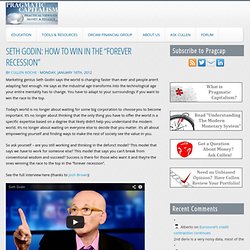
Anyone remember the howls from the 90s, at least here in Europe, about the ‘knowledge economy’. That’s what Britain did. Germany ignored that, and doubled down on manufacturing. And who won out in the end? That isn’t to say that technology etc will play an increasingly bigger role in our lives. Work is becomming increasingly scarce even for college grads. The thing is, most people are not entrepreneurs by nature. And if the economic system doesn’t favor that, you’ll have anarchy and social revolts. Like all marketing guys this guy is over the top. China has a much lower unemployment, higher literate levels and so on.
Nontheless, where will it all end up? In the short run, we can probably employ most people out of work today. By the way, Cullen, a ‘marketing’ guy is a kind of person who thrives on sensationalism and typically writes loads of stuff for the sake of writing stuff. Gender Equality.
Baltic Exchange Dry Index (BDI) & Freight Rates. 1/18/13 Global containership capacity grew 6% to 16.3 TEU million in 2012 11/30/12 ASIA-EUROPE rates continued in decline last week to US$1,028 per TEU, down 4.7%, or $51 per TEU WoW, representing the lowest point reached since March, according to the Shanghai Containerised Freight Index (SCFI). 3/16/12 BIMCO forecasts 20 million DWT of dry bulk to be recycled during 2012 2/12/2012 Barrons: Baltic Dry: Not Washed Up -- News that the Baltic Dry Index is sunk as an economic indicator is much exaggerated.
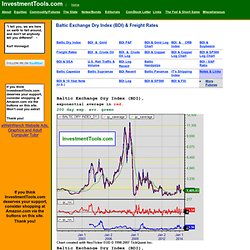
The index—which measures the cost to haul dry freight over the world's oceans—has merely run aground after getting hit with a shipping-market tsunami. Don't worry. The cost of shipping dry commodities, such as coal, iron ore and grains, forms the basis for the BDI. 12/9/2011 Capesize rates rose to 21-month highs on Chinese iron ore demand that is estimated to grow 20% by 2015 11/6/2011 Will They Never Learn? 8/27/10 U.S. 7/25/10 China's port box volumes up 7.3 - 13.9% in first half of 2010. Baltic Dry Index. Baltic Dry Index 1985–2013 The Baltic Dry Index (BDI) is a number (in USD) issued daily by the London-based Baltic Exchange.
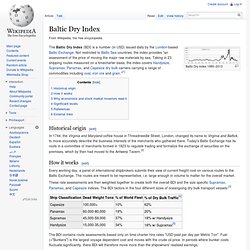
Not restricted to Baltic Sea countries, the index provides "an assessment of the price of moving the major raw materials by sea. Taking in 23 shipping routes measured on a timecharter basis, the index covers Handysize, Supramax, Panamax, and Capesize dry bulk carriers carrying a range of commodities including coal, iron ore and grain. "[1] Historical origin[edit] In 1744, the Virginia and Maryland coffee house in Threadneedle Street, London, changed its name to Virginia and Baltick, to more accurately describe the business interests of the merchants who gathered there.
Mexique. Prostitution.